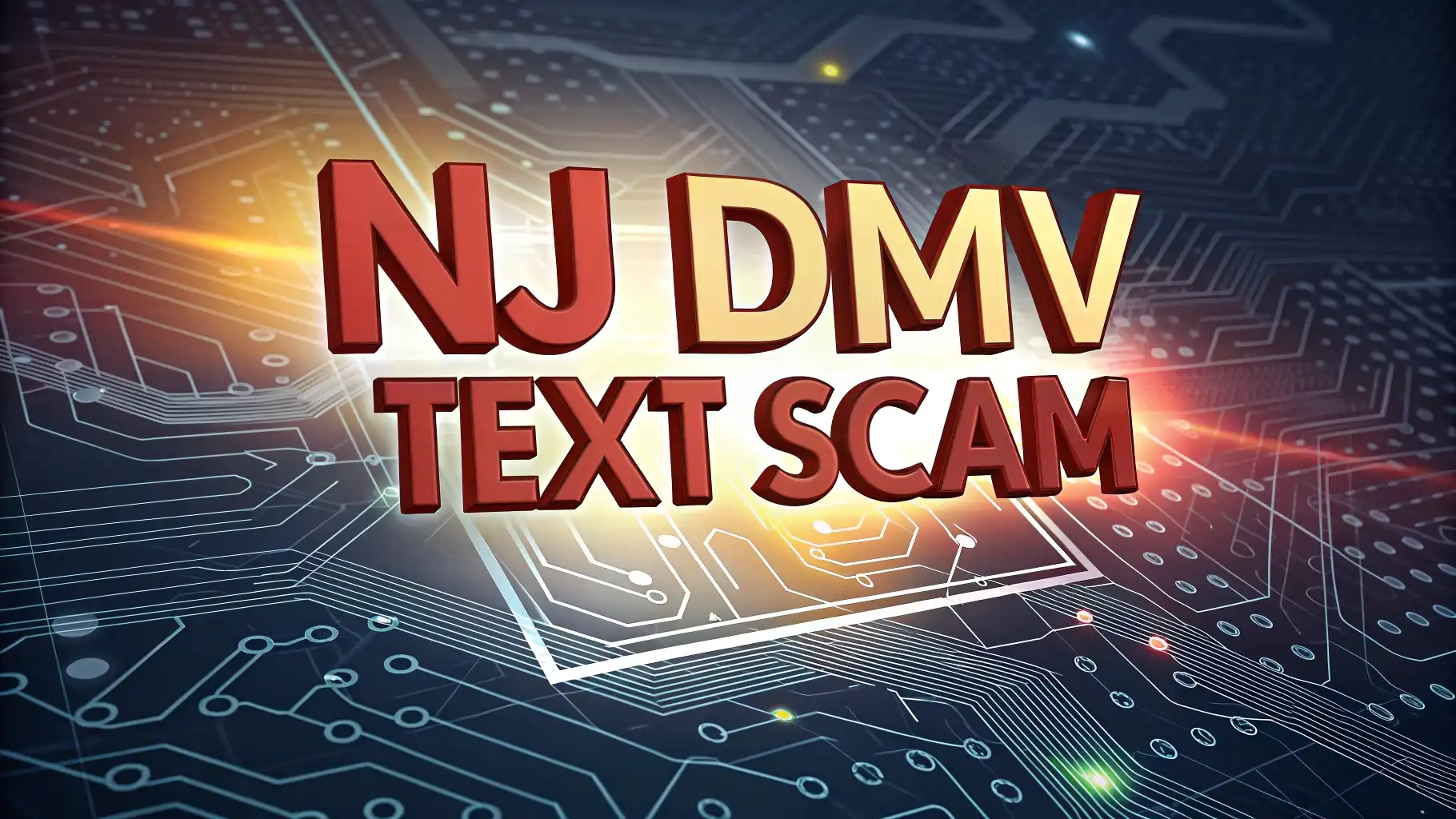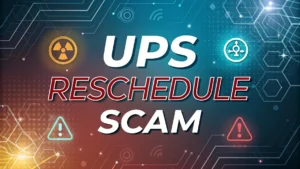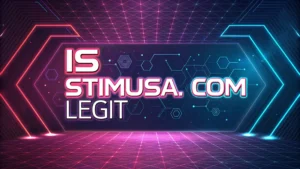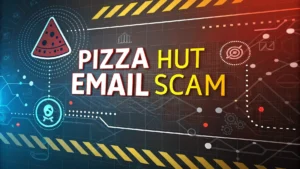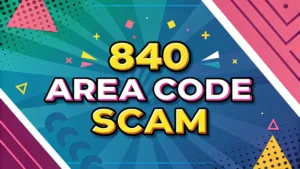Text message scams impersonating the NJ DMV have exploded across the state, putting residents at risk of identity theft and financial fraud.
These sophisticated scams, known as “smishing” attacks, use fake text messages to trick unsuspecting victims into clicking malicious links, sharing personal information, or sending money to criminals.
In this comprehensive guide, we’ll expose how these NJ DMV text scams work, share real examples to help you identify them, and provide actionable steps to protect yourself from becoming a victim.
Key Takeaways: NJ DMV Text Scam Essentials
- The NJ MVC does not send unsolicited text messages about traffic tickets, license renewals, or refunds. They only send text reminders for scheduled appointments you’ve already made.
- Scam texts typically contain urgent threats about suspended licenses, registration cancellations, or unpaid fines with immediate deadlines to create panic and pressure you to act quickly.
- Never click links in suspicious messages as they lead to fake websites designed to steal your personal information including driver’s license numbers, Social Security numbers, and credit card details.
- Report suspected DMV text scams by forwarding the message to 7726 (SPAM) and filing reports with the FTC at reportfraud.ftc.gov and the FBI’s Internet Crime Complaint Center at ic3.gov.
- If you’ve already clicked a link or shared information, take immediate action by freezing your credit, changing passwords, contacting your bank’s fraud department, and monitoring your accounts for suspicious activity.
How NJ DMV Text Scams Work
The mechanics behind NJ DMV text scams are surprisingly simple yet highly effective. Scammers use mass texting technology to send thousands of messages simultaneously, knowing that some recipients will inevitably be NJ drivers. These fraudsters create messages designed to trigger immediate emotional responses like fear or excitement.
The process typically works as follows:
You receive an unexpected text message claiming to be from the New Jersey Motor Vehicle Commission. The message appears urgent and threatens negative consequences if you don’t take action right away. For example, it might claim your license will be suspended, your registration canceled, or that you owe money for traffic violations.
The message contains a link to a fake website that looks remarkably similar to the official NJ MVC site. However, this site is actually controlled by scammers and designed to steal your information. Some scams might include a phone number to call instead of a link, where a person will try to collect your personal details or payment information.
If you click the link or call the number, you’re asked to provide sensitive information like your driver’s license number, Social Security number, credit card details, or other personal data. Once scammers obtain this information, they can use it to steal your identity, access your financial accounts, or commit other types of fraud.
The New Jersey MVC has officially confirmed that they do not send unsolicited text messages about driver’s status or other issues. The only legitimate texts from the MVC are appointment reminders that you specifically signed up for.
Common Types of NJ DMV Text Scams
Understanding the various forms these scams take can help you identify and avoid them. Here are the most prevalent NJ DMV text scams currently targeting residents:
Traffic Ticket Scams
This extremely common version claims you have an unpaid traffic violation that requires immediate payment. The text typically threatens severe consequences like license suspension, increased tolls, and negative credit impacts if you don’t pay immediately. It often includes official-looking terminology and arbitrary deadlines to create urgency.
For example, a recent scam text read: “Final Notice: NJ MVC records show unpaid traffic ticket. Pay now to avoid license suspension on June 2. Click: njmvc-payments.com“
License Compliance Scams
These messages claim your driver’s license no longer complies with federal regulations or state requirements. They urge you to update your information immediately to keep your license active. The scam exploits confusion around REAL ID requirements that many states have implemented.
A typical message might say: “ATTENTION Driver License Holder: Your NJ license does not comply with federal rules. Update required within 48 hours. Visit: nj-license-update.com“
Refund or Rebate Scams
These scams take a different approach by offering something valuable rather than threatening penalties. They claim you’re entitled to a refund due to overpayment or a special rebate program (such as a “fuel rebate”). While the promise of free money is tempting, these messages are designed to collect your financial information.
One example reads: “NJ MVC Notice: You are eligible for $175 registration fee refund. Claim within 7 days: njmvc-refunds.com“
Fake Appointment Reminders
Even if you haven’t scheduled an appointment with the NJ MVC, you might receive a text claiming to confirm one. These messages aim to confuse you into clicking a link to “check” or “cancel” this non-existent appointment. Once you click, you’re directed to a phishing site.
A common version states: “Your NJ MVC appointment is confirmed for tomorrow at 10:30 AM. Unable to attend? Cancel here: mvc-appointments.net“
COVID-19 Validation Scams
Taking advantage of pandemic confusion, these messages claim the MVC requires drivers to validate their COVID-19 status to maintain their licenses. This type of scam exploits health concerns while attempting to collect both personal and medical information.
Red Flags: How to Identify NJ DMV Text Scams
Learning to spot the warning signs of these scams can save you from becoming a victim. Here are key indicators that a text message claiming to be from the NJ DMV is actually fraudulent:
Unexpected Contact
The most obvious red flag is receiving an unsolicited text from the “DMV” or “MVC.” The New Jersey Motor Vehicle Commission has explicitly stated they do not send text messages about driver status, violations, or payments. The only legitimate texts from the MVC are appointment reminders you’ve specifically requested.
Urgent Threats and Deadlines
Scammers create artificial time pressure to force quick, thoughtless actions. Messages that claim your license will be suspended “tomorrow” or your vehicle registration will be canceled “within 24 hours” unless you take immediate action are almost certainly scams. Legitimate government agencies provide reasonable timeframes and send official notices by mail.
Suspicious Links
Links in these text messages often use URLs that look somewhat official but aren’t actually from the government. Legitimate NJ MVC communications come from the official website njmvc.gov. Scam links often use variations like “nj-mvc.com,” “njmvc-online.org,” or include words like “payments,” “verify,” or “update” in the URL.
Grammar and Spelling Errors
While scammers have improved their techniques, many fraudulent messages still contain subtle errors. Watch for unusual capitalization (like “Driver License” instead of “driver’s license”), missing punctuation, or awkward phrasing that doesn’t sound like official government communication.
Requests for Personal Information
The NJ MVC already has your personal information on file and would never ask you to text or email sensitive details like your Social Security number, driver’s license number, or credit card information. Any text asking for this type of information is a clear indication of a scam.
Suspicious Payment Methods
Government agencies have established, secure payment systems. Scammers often request payment through unusual methods like gift cards, wire transfers, cryptocurrency, or payment apps. The real MVC would never ask for payment through these channels.
Real Examples of NJ DMV Text Scams
Seeing actual examples of these scams can help you recognize them when they appear in your message inbox. Here are some real NJ DMV text scams that have been reported:
“FINAL NOTICE: NJ MVC Traffic Violation #74291. Pay $58.20 immediately or face license suspension, increased tolls & credit penalties. Reply Y to pay: njmvc-violations.com“
“NewJerseyDMV ALERT: Your vehicle registration will be suspended due to an unpaid toll. To stop suspension, visit: nj-pay-ezpass.com“
“NJ Motor Vehicle Commission: FINAL REMINDER – Your license does not comply with REAL ID requirements. Update needed within 24 hours: njrealid-verify.com“
“ATTENTION: Your NJ MVC account shows eligibility for $1500 fuel rebate per vehicle. Claim now: njrebate-claim.com“
“NJ MVC Appointment Confirmation: Your appointment is scheduled for 05/31/2025 at 2:15 PM. Unable to attend? Cancel here: mvc-schedule.net“
These examples demonstrate the variety of tactics used, but they all share common elements: urgency, threats or enticing offers, suspicious links, and requests for action outside normal government procedures.
What to Do if You Receive a DMV Text Scam
If you receive a text message claiming to be from the NJ MVC, follow these steps to protect yourself:
Do Not Engage
The safest response is no response at all. Don’t reply to the message, don’t click any links, and don’t call any phone numbers included in the text. Even responding with “STOP” can confirm to scammers that your number is active, potentially leading to more scam attempts.
Verify Independently
If you’re concerned the message might be legitimate, contact the NJ MVC directly using their official contact information. Visit the official website (njmvc.gov) or call their official customer service number (609-292-6500). Never use contact information provided in the suspicious text itself.
Report the Scam
Help protect others by reporting the scam text. Forward the message to 7726 (SPAM), which alerts your wireless provider about the scam. This helps them block similar messages in the future. You can also report it to:
- The Federal Trade Commission at reportfraud.ftc.gov
- The FBI’s Internet Crime Complaint Center at ic3.gov
- The New Jersey Cybersecurity & Communications Integration Cell at cyber.nj.gov
Block the Number
After reporting the message, block the sender’s number in your phone settings to prevent receiving additional messages from the same source. Keep in mind that scammers frequently change numbers, so you may still receive similar scams from different numbers.
Alert Friends and Family
Share information about the scam with your friends and family, especially those who might be more vulnerable to such tactics. Awareness is a powerful tool against scammers.
What Happens if You Fall Victim to a DMV Text Scam
If you’ve already clicked a link, shared personal information, or made a payment in response to a DMV text scam, take these steps immediately to mitigate potential damage:
If You Clicked a Link
Clicking a malicious link can potentially install malware on your device. Disconnect your device from the internet immediately and run a complete scan using reliable antivirus software. Look for and uninstall any suspicious apps or programs that may have been installed without your knowledge.
If You Shared Personal Information
If you provided personal information like your driver’s license number, Social Security number, or financial details, act quickly to protect your identity:
- Place a freeze on your credit reports with all three major credit bureaus (Equifax, Experian, and TransUnion) to prevent scammers from opening new accounts in your name.
- Contact your bank and credit card companies to alert them about potential fraud and consider changing your account numbers.
- Change passwords for all your important online accounts, especially your email and financial accounts. Use strong, unique passwords for each account.
- Monitor your accounts closely for any unauthorized transactions or suspicious activity.
- Consider identity theft protection services that provide monitoring and insurance against further damage.
If You Made a Payment
If you sent money to scammers:
- Contact your payment provider immediately to report the fraud and request a reversal of the transaction if possible.
- File a police report with your local law enforcement agency, which may be necessary for insurance claims or resolving certain types of fraud.
- Document everything related to the scam, including the original message, any websites you visited, information you shared, and actions you’ve taken since discovering the fraud.
The impact of falling victim to these scams can range from minor inconveniences to significant financial and identity theft issues. According to cybersecurity experts, victims of smishing scams lose an average of $1,200 when they fall victim to these attacks, and recovering from identity theft can take hundreds of hours and months of effort.
How to Prevent Future DMV Text Scams
While you can’t stop scammers from sending messages, you can take proactive steps to protect yourself from future DMV text scams:
Stay Informed
Keep yourself updated on current scam techniques and warnings. The NJ MVC website and social media accounts often post alerts about active scams targeting New Jersey residents. Following these official channels helps you stay ahead of new scam tactics.
Use Text Message Filters
Most smartphones have built-in features or support apps that can filter potential spam messages. On iPhone, you can enable “Filter Unknown Senders” in your Messages settings. Android users can use the default Messages app’s spam protection feature or download trusted third-party spam filtering apps.
Be Skeptical of All Unexpected Messages
Adopt a cautious approach to any unexpected text messages, especially those claiming to be from government agencies. Remember that important official communications typically come through mail rather than text messages.
Verify Before Taking Action
Before responding to any message claiming to be from the DMV or other government agency, verify its authenticity through official channels. Visit the agency’s official website directly (not through links in messages) or call their published phone number.
Keep Your Device Secure
Ensure your smartphone has the latest security updates and consider installing trusted security software that can detect and block phishing attempts and malicious links.
Educate Vulnerable Family Members
Older adults and those less familiar with technology are often targeted by scammers. Take time to educate family members about these scams and help them set up security measures on their devices.
How the NJ MVC Actually Communicates
Understanding how the New Jersey Motor Vehicle Commission legitimately communicates with residents can help you distinguish between real and fraudulent messages:
Official Mail Communications
The NJ MVC sends most official notices and communications through the United States Postal Service. Important matters like license renewals, registration issues, suspensions, or violations are communicated via official letters on MVC letterhead.
Requested Text Reminders
The only text messages the NJ MVC sends are appointment reminders that you have specifically signed up for when scheduling your appointment. These messages will not contain links to click or ask for any personal information.
Official Email Communications
If you’ve provided your email address to the MVC for specific services, they may send legitimate email communications. However, these emails will never ask you to provide sensitive information through unsecured channels.
Official Website
All legitimate online services from the NJ MVC are conducted through their official website: njmvc.gov. Any other website claiming to be the MVC is likely fraudulent.
Phone Calls
The MVC rarely initiates phone calls to residents. If you receive a call claiming to be from the MVC, do not provide personal information. Instead, tell them you will call back and then dial the official MVC phone number to verify if the call was legitimate.
The Technology Behind DMV Text Scams
Understanding how scammers operate can help you appreciate why these scams are so prevalent and effective:
Mass Messaging Systems
Scammers use automated systems to send thousands or even millions of text messages at once. Even if only a small percentage of recipients respond, the scam can be profitable.
Spoofing Technology
Advanced spoofing tools allow scammers to make their messages appear to come from official sources. They can make the sender ID display as “NJ-DMV” or something similarly official-looking, increasing the likelihood that recipients will trust the message.
Phishing Websites
The links in scam texts lead to sophisticated fake websites that closely mimic official government sites. These sites often use similar colors, logos, and layouts as the real sites to build trust with victims.
Data Collection Methods
Once you visit a scammer’s website, they can collect various types of data about you, from the information you directly enter to technical details about your device that can be used in future, more targeted scams.
Psychological Manipulation
These scams are carefully crafted based on principles of social engineering and psychological manipulation. They exploit common emotional triggers like fear, urgency, curiosity, or greed to bypass your rational thinking processes.
Legal Protections and Law Enforcement Efforts
Various laws and agencies are working to combat text message scams:
Federal Laws
The Telephone Consumer Protection Act (TCPA) and the CAN-SPAM Act provide some protections against unwanted text messages and set penalties for violators. The Federal Communications Commission (FCC) has also implemented rules requiring phone companies to block obviously fraudulent text messages.
State Efforts
New Jersey has its own consumer protection laws that apply to text message scams. The New Jersey Division of Consumer Affairs investigates complaints about these scams and can take action against perpetrators when they’re identified.
Law Enforcement Actions
The FBI, FTC, and state law enforcement agencies actively investigate large-scale text message scam operations. While individual scammers can be difficult to catch, authorities have successfully shut down major scam networks.
Industry Initiatives
Mobile carriers are implementing new technologies to detect and block suspicious text messages before they reach consumers. These efforts include analyzing message patterns and blocking messages from known scam sources.
The Future of DMV Text Scams
As technology evolves, so do scam techniques. Here’s what to watch for in the future:
More Sophisticated AI-Generated Content
Artificial intelligence tools are making it easier for scammers to create convincing messages without grammatical errors or awkward phrasing that might tip off potential victims.
Increased Personalization
Future scams may incorporate more personal details obtained from data breaches or social media to make messages more convincing. For example, a scam might include your actual vehicle make and model or reference the real NJ MVC location nearest to you.
Integration with Other Scam Methods
Expect to see more complex scams that combine text messages with emails, phone calls, and even fake physical mail to create comprehensive fraud attempts that are harder to identify.
Exploitation of Current Events
Scammers quickly adapt to current events and concerns. Future scams will likely reference new laws, regulations, or requirements as they are introduced to create confusion and urgency.
Frequently Asked Questions
Does the NJ MVC ever send text messages?
The NJ MVC only sends text messages as reminders for appointments that you have already scheduled. They do not send unsolicited texts about traffic tickets, license issues, or refunds.
How can I verify if a text from the DMV is real?
The safest approach is to ignore the text completely and contact the NJ MVC directly through their official website (njmvc.gov) or by calling their customer service number (609-292-6500).
What should I do if I already clicked a link in a scam text?
Run antivirus software on your device immediately, change passwords for important accounts, monitor your financial statements for unauthorized charges, and consider placing a freeze on your credit reports.
How do I report a DMV text scam?
Forward the message to 7726 (SPAM), report it to the FTC at reportfraud.ftc.gov, and file a complaint with the FBI’s Internet Crime Complaint Center at ic3.gov.
Can scammers access my information just by me opening their text?
Simply opening a text message is generally safe, but do not click any links, download attachments, or reply to the message, as these actions can lead to compromising your information.
Will blocking scam numbers stop future scam texts?
Blocking individual numbers helps, but scammers frequently change the numbers they use. Consider using your phone’s spam filtering features or a dedicated security app for better protection.
How quickly do I need to act if I shared personal information?
Act immediately. The sooner you take protective measures like freezing credit reports and changing passwords, the better chance you have of preventing serious damage.
Are older adults more vulnerable to these scams?
While anyone can fall victim to sophisticated scams, older adults are often specifically targeted and may be less familiar with the warning signs of digital fraud.
Can text message scammers be caught and prosecuted?
Yes, but it’s challenging. Many operate from outside the US or use techniques that make them difficult to trace. However, law enforcement has successfully prosecuted some large-scale operations.
What information does the real NJ MVC have about me?
The NJ MVC maintains records including your name, address, date of birth, driver’s license number, vehicle registration information, and driving history. They already have this information and would not need to request it via text.

